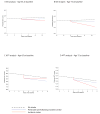Risk Factors for Poststroke Cognitive Decline: The REGARDS Study (Reasons for Geographic and Racial Differences in Stroke)
- PMID: 29581343
- PMCID: PMC6419761
- DOI: 10.1161/STROKEAHA.117.018529
Risk Factors for Poststroke Cognitive Decline: The REGARDS Study (Reasons for Geographic and Racial Differences in Stroke)
Abstract
Background and purpose: Poststroke cognitive decline causes disability. Risk factors for poststroke cognitive decline independent of survivors' prestroke cognitive trajectories are uncertain.
Methods: Among 22 875 participants aged ≥45 years without baseline cognitive impairment from the REGARDS cohort (Reasons for Geographic and Racial Differences in Stroke), enrolled from 2003 to 2007 and followed through September 2015, we measured the effect of incident stroke (n=694) on changes in cognitive functions and cognitive impairment (Six-Item Screener score <5) and tested whether patient factors modified the effect. Median follow-up was 8.2 years.
Results: Incident stroke was associated with acute declines in global cognition, new learning, verbal memory, and executive function. Acute declines in global cognition after stroke were greater in survivors who were black (P=0.04), men (P=0.04), and had cardioembolic (P=0.001) or large artery stroke (P=0.001). Acute declines in executive function after stroke were greater in survivors who had <high school education versus college graduates (P=0.01). Incident stroke was associated with faster declines in global cognition and executive function but not new learning or verbal memory compared with prestroke slopes. Faster declines in global cognition over years after stroke were greater in survivors who were older (P<0.01), resided outside the Stroke Belt (P=0.005), or had cardioembolic stroke (P=0.01). Faster declines in executive function over years after stroke were greater in survivors who were older (P<0.01) or lacked hypertension (P=0.03).
Conclusions: Incident stroke alters a patient's cognitive trajectory, and this effect is greater with increasing age and cardioembolic stroke. Race, sex, geography, and hypertension status may modify the risk of poststroke cognitive decline.
Keywords: cognition; geography; humans; risk factors; stroke; survivors.
© 2018 American Heart Association, Inc.
Conflict of interest statement
Dr. Levine reports consultant/advisory board work for Astra Zeneca/UCSF (SOCRATES trial event adjudicator), UCSF (POINT trial event adjudicator), Program Advisory Committee of the Kaiser Permanente Northern California – UCSF Stroke Prevention/Intervention Research Program. Dr. Galecki received grant support from the NIA/NIH P30AG024824.
Figures

References
-
- Ivan CS, Seshadri S, Beiser A, Au R, Kase CS, Kelly-Hayes M, et al. Dementia after stroke: The framingham study. Stroke. 2004;35:1264–1268. - PubMed
-
- Pendlebury ST, Rothwell PM. Prevalence, incidence, and factors associated with pre-stroke and post-stroke dementia: A systematic review and meta-analysis. Lancet Neurol. 2009;8:1006–1018. - PubMed
-
- Centers for Disease Control and Prevention. National diabetes fact sheet: National estimates and general information on diabetes and prediabetes in the united states. U.S. Department of Health and Human Services, Centers for Disease Control and Prevention; Atlanta, GA: 2011.
-
- Desmond DW, Moroney JT, Sano M, Stern Y. Incidence of dementia after ischemic stroke: Results of a longitudinal study. Stroke. 2002;33:2254–2260. - PubMed
Publication types
MeSH terms
Grants and funding
LinkOut - more resources
Full Text Sources
Other Literature Sources
Medical

